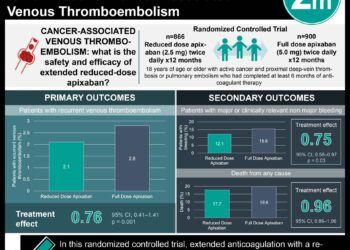Adalimumab aids in control of noninfectious uveitis
1. Patients with noninfectious intermediate or posterior uveitis or panuveitis had their symptoms controlled for longer on adalimumab treatment compared to placebo.
2. Patients treated with adalimumab had more adverse events and serious adverse events compared to the placebo treated group.
Evidence Rating: 1 (Excellent)
Study Rundown: Noninfectious uveitis is a group of conditions that can manifest alone or as part of various systemic disorders. If untreated or uncontrolled it can put one’s vision at risk. Current medical therapy for noninfectious uveitis often includes glucocorticoids, which can cause various undesired effects. Tumor necrosis factor alpha (TNF-α) is considered active in uveitis inflammation, so the anti–TNF-α monoclonal antibody Adalimumab has been considered as a potential agent for glucocorticoid-sparing noninfectious uveitis control. This study was conducted to evaluate the efficacy and safety of this treatment.
Patients with active noninfectious intermediate or posterior uveitis of panuveitis despite prior glucocorticoid treatment were included in the study. Participants received either adalimumab or placebo. The primary endpoint of the study was treatment failure (return of specific uveitis symptoms or uveitis markers) after 6 weeks. Patients in the adalimumab group had a median time to treatment failure of 24 weeks while that of the placebo group was 13 weeks. Those in the adalimumab group were also less likely to reach treatment failure compared to the placebo group. Adverse events were more common in the adalimumab group, as were serious adverse events.
Click to read the study, published today in NEJM
Relevant Reading: The role of tumor necrosis factor (TNF-alpha) in experimental autoimune uveoretinitis (EAU)
In-Depth [randomized control trial]: This phase 3 international trail was conducted at multiple sites from August 2010 to August 2014. Patients with active noninfectious uveitis who were nonresponsive to prior glucocorticoid treatment were divided in a 1:1 ratio between treatment (abalimumab, n = 110) and placebo (n = 107) groups, and stratified by glucocorticoid treatment at baseline. Adalimumab was given at baseline (80 mg) and every 2 weeks from week 1 onwards (40 mg) and delivered subcutaneously. At baseline all patients were given prednisone (60 mg) and were tapered on a standardized schedule. Follow-up visits with patients to document their uveitis occurred at weeks 0, 1, 4, 6, 8, and approximately every subsequent 4 weeks. The primary endpoint of the study was treatment failure after week 6, defined by recurrence of various uveitis signs and/or symptoms. Patients were monitored for side effects from the beginning of the study to 70 days after their last treatment or placebo. Median time to treatment failure was 24 weeks in the adalimumab group and 13 weeks in the placebo group. Treated patients were less likely to reach treatment failure compared to the placebo group (HR 0.50; 95%CI 0.36 to 0.70; p < 0.001). This finding did not prove to be true among patients with birdshot choroidopathy (HR 0.49; 95%CI 0.21 to 1.14; p = 0.09).
Increase in vitreous haze grade was the reason for treatment failure in 36% of the placebo group and 15% of the treatment group. The adalimumab group had more adverse events (1052.4 vs. 971.7) and serious adverse events (28.8 vs. 13.6) per 100 person-years.
Image: PD
©2016 2 Minute Medicine, Inc. All rights reserved. No works may be reproduced without expressed written consent from 2 Minute Medicine, Inc. Inquire about licensing here. No article should be construed as medical advice and is not intended as such by the authors or by 2 Minute Medicine, Inc.





![Adverse pregnancy outcomes associated with thrombophilias [Classics Series]](https://www.2minutemedicine.com/wp-content/uploads/2015/07/Classics-2-Minute-Medicine-e1436017941513-75x75.png)

